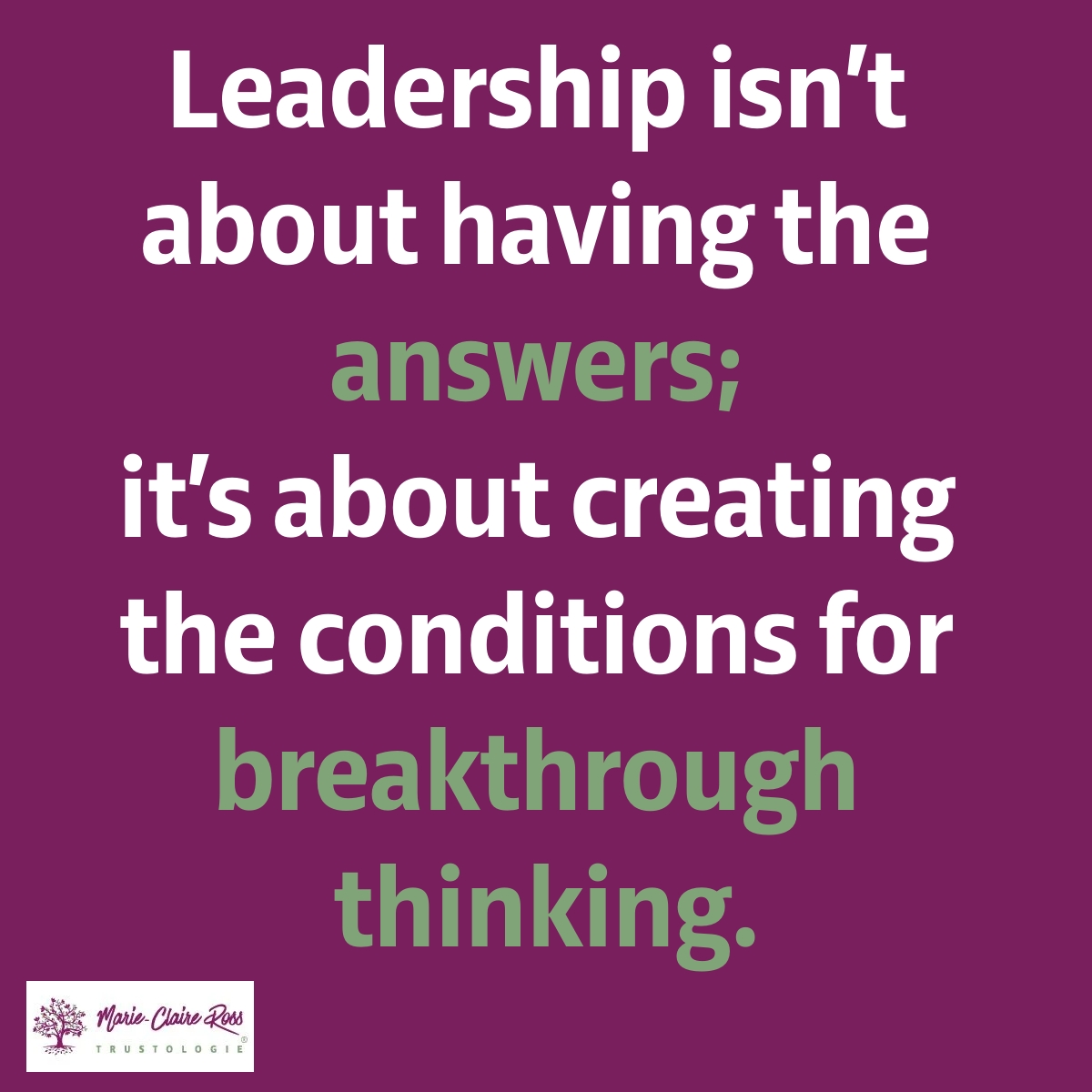8 min read
Beyond the "Why": 5 Coaching Secrets to Unlock Curiosity in Leadership
When my daughter was 17 months old, she discovered a superpower: the word “Why?”For the next two years, it was her response to almost everything.
Develop leaders, strengthen executive teams and gain deep insights with assessments designed to accelerate trust and performance.

Transform how your leaders think and perform with keynotes that spark connection, trust and high-performance cultures.

Explore practical tools, thought-leadership and resources to help you build trusted, high-performing teams.

Trustologie® is a leadership development consultancy founded by Marie-Claire Ross, specialising in helping executives and managers build high-trust, high-performing teams.

4 min read
Marie-Claire Ross : Updated on April 16, 2024

Emotionally intelligent leaders strive to support and uplift their teams in every possible way. However, when a well-meaning manager is overwhelmed by their own or others' emotions, things start to go a little bit awry.
Let's go through six things that can get in your way.
1. Worry about their team - This is a big one and it gets in the way of every emotionally intelligent leader I know. They worry about their team. They worry about what team members think of them, how they will handle new company directives, or a new round of redundancies. They worry about nasty comments that were traded between team members. Their fear of disappointing others drives them to make everyone feel comfortable around them. They people-please.
The thing is we can't control how other people feel. Nor can we create a non-challenging, stable environment all of the time.
When we worry about everyone else around us, we are less effective. We are moving our focus from where it needs to be to all of the minor distractions around us.
All we can control is how we react and act. And sometimes this means allowing people to experience pain and frustration.
Emotionally intelligent leaders are more effective when they let people experience their own negative feelings and don't get dragged down into them.
2. Jumping in and fixing everything - When we see someone is upset and complaining, an emotional intelligent leader will feel that they need to jump in and fix the situation.
However, there are instances where individuals in our team may have a tendency to voice their complaints frequently. For many of us, we have learnt that if we complain, someone will come along and fix things for us. It's also how we get attention. And I blame our parents.
Think about your childhood. Did your mother prioritise your comfort and convenience? Did she always try and fix things for you (so you'd stop whining)? Do you have a sibling who always gets what they want because they complain the most and play the victim card? And are you doing that with your own kids?
Well-intentioned parents soothe their children by giving them what they want. They inadvertently create complaining colleagues who expect their boss to make things right for them or who get attention through complaining.
Emotionally intelligent leaders know to let people complain, but don't feel the need to jump in and fix everything (or inflame the complaining). Instead, they empower people to solve the problem themselves.
3. Allowing their emotions to run a situation - There are times when emotions can run high. Rather than let these experiences run you down (or explode in rage), an emotionally intelligent leader is aware of what behaviours or event triggers them (or those around them) and gets prepared.
This might mean booking a performance conversation before a lunch break, so you can take time to decompress if you know the conversation will get heated.
It might mean doing a meditation exercise before you go into a meeting where you know you will get stressed out.
Emotionally intelligent leaders do what they can to stay grounded and not let their emotions get in the way of a productive conversation. They have learnt to not take everything personally and not let other people's emotions derail them.
4. Not explaining what stress does to you - There are times when we behave in ways that embarrass us. It might be over-reacting to an interruption or abruptly cutting someone off mid sentence.
It's beneficial to know how you tend to react during times of high stress and explaining that to your team in advance.
Emotionally intelligent leaders talk to their team about their stress points. They flag in advance how they might behave and let their team know it doesn't mean they are unhappy with them. They also get their team to share their emotional triggers, as well.
5. Allowing emotional venting without specific action - We can often be in the presence of team members who want to express their frustration at a certain event.
While we all need to vent from time to time, sometimes it can really get in the way.
The trick is knowing the difference between someone needing to get something off their chest (before they can take action) versus someone who needs to vent (and is not ready to take action).
An emotionally intelligent leader gives people the space to emotionally express, but helps them work out what action they need to take, to get out of being in that state.
This means understanding when to interrupt emotional reactions, so that your team doesn't get stuck in unproductive emotions.
6. Over-protecting your team - It is common for an emotionally intelligent leader to feel really protective about their team and go into "mother bear mode." They get all worked up about complaints that their team is being treated unfairly and they go bat for their team.
But this can send warning signals to leadership that you aren't leading strategically.
There is a real need to balance the emotional needs of your team with the strategic needs of the business. And at times, this involves preventing highly negative team members from infecting your team with a wave of pessimism.
An emotionally intelligent leader ensures that they are not so emotionally invested in their team that they automatically buy-in to all of their stories and excuses. They also make sure their team is accountable and don't allow negative events to derail their progress. Instead, they work on focusing their team on what needs to be done and inspire them to be excited about the future.

8 min read
When my daughter was 17 months old, she discovered a superpower: the word “Why?”For the next two years, it was her response to almost everything.

11 min read
I have a friend who often finds herself at the mercy of her emotions. Recently, she called me to rehash a confrontation she’d had with a group of...

9 min read
True leadership presence isn’t a performance or a set of charisma hacks; it is the felt experience of who you are being in the room. By cultivating...

I have a friend who often finds herself at the mercy of her emotions. Recently, she called me to rehash a confrontation she’d had with a group of...

Over the last decades, marketers have gradually learnt that selling products by promoting rational features doesn’t work. People buy based on their...
Back when I was a kid in the 1980s, I attended one of my father’s business classes that he taught at a University. As an awkward 12 year old, in a...